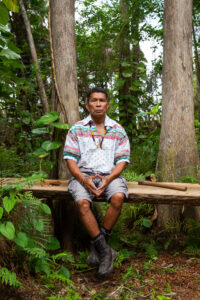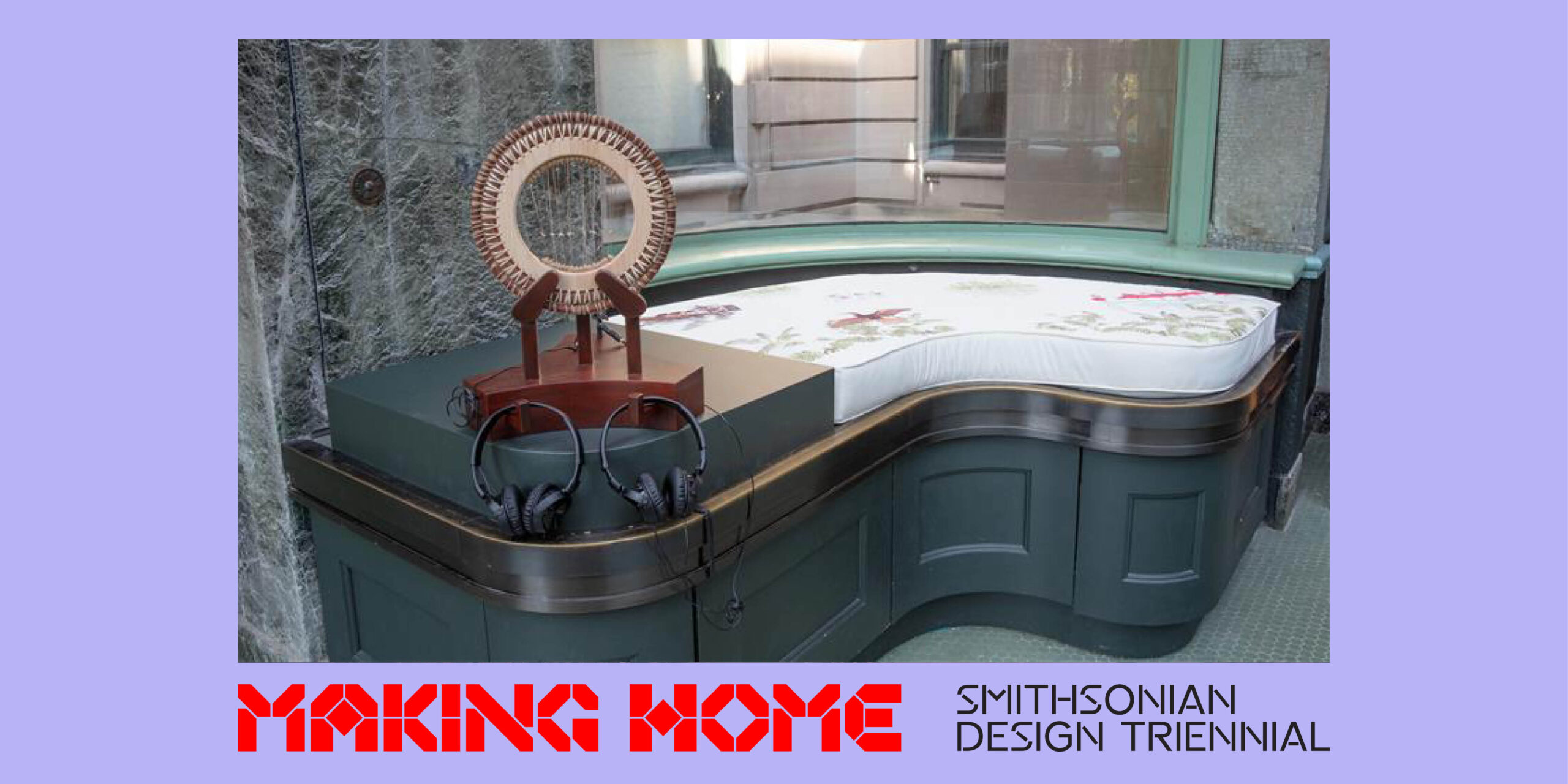Making Home Saturday Series: Building Home (Session 3)
A presentation on water advocacy and rethinking environmental design systems for preservation
April 26, 2025 – 2:00 p.m. to 3:15 P.m.
Explore water advocacy and rethinking environmental design systems for preservation with Two-Spirit poet, artist, and activist Reverend Houston Cypress (Otter Clan of the Miccosukee Tribe of Indians of Florida), canoe maker Daniel Tommie (Seminole Tribe of Florida), water rights activist Betty Osceola (Panther Clan of the Miccosukee Tribe of Indians of Florida) and Zarith Pineda, Founder & Executive Director of New York–based organization Territorial Empathy.
Featured in the Triennial installation “Ebb + Flow,” Cypress, Tommie, and Osceola have dedicated their lives to fore fronting learnings from the Ancestral past. The installation, organized by Artists in Residence in Everglades (AIRIE), assembles collective stories and sounds from the Everglades wetlands of South Florida. The project honors the communities and various ecosystems of this region, considering a worldview that expands beyond the human era. Similarly, in the South Bronx, Pineda just launched a project called H.earth, a garden sanctuary for community care and activism, mutual aid, and cultural preservation.
This program will be moderated by Triennial co-curator Alexandra Cunningham Cameron and is being held as part of the Making Home Saturday Series: Building Home, a day-long, multi-format public program and celebration taking place across the museum’s galleries and garden involving several Making Home—Smithsonian Design Triennial designers and architects. Through food, song, storytelling, and conversation, the participants will share the cultural perspectives, models of environmental advocacy, and systems of Indigenous building they explore in their Making Home commissions.
This program is now available to watch online.
Learn more about the other Sessions.
About the Speakers
Reverend Houston Cypress (Otter Clan of the Miccosukee Tribe of Indians of Florida) is a Two-Spirit, Indigiqueer Artist and Environmentalist. He grew up in the River of Grass region of the Greater Everglades – a place of refuge for his ancestors, and the source of traditional plant medicines. Early on, he appreciated art as a form of knowledge production by learning woodcarving from his grandfather and collaborating with his mother to produce her Miccosukee fashion shows. He embraces poetry as a foundation of his artistic and spiritual practices, including his audiovisual work.
Zarith Pineda is an architectural and urban designer and the Founder & Executive Director of Territorial Empathy, a nonprofit design collective that believes in the power of empathy to create positive change in our urban environments. In 2017, she was appointed to teach Digital Design Techniques, Urban Theory, and Data Visualization at Columbia University as an Adjunct Associate Professor. At Columbia, her research on water diplomacy, spatial justice, and conflict urbanism awarded her the prestigious Lowenfish Memorial Prize. Zarith has practiced at a number of national/ international architectural and urban design firms where she was involved in a broad range of institutional, residential, and planning projects. Zarith’s work has been published and exhibited in New York, New Orleans, Washington, D.C., Paris, Brussels, Venice, Amman, and Tel Aviv. She appreciates a good IPA, listening to podcasts, and FaceTiming her genius nephew, Oliver.
Betty Osceola (Panther Clan of the Miccosukee Tribe of Indians of Florida) serves on the Miccosukee Tribe’s Everglades Advisory Committee and is a tribal court judge. Growing up in the Miccosukee way of life has shaped how she understands and respects the natural world around her. Using Miccosukee Indigenous Knowledge, she has advocated and educated about environmental conservation and protection. She has led multiple prayer walks to highlight environmental issues. Osceola is a staunch advocate for Indigenous Peoples rights to practice their traditions and culture. She has also appeared in multiple environmental documentaries such as Path of the Panther, Women of the Watershed, and River of Grass. In 2024, Osceola received the Marjory Stone Douglas Award from Friends of the Everglades. She serves as an advisory member of Florida International University’s Global Indigenous Forum.

Daniel Tommie (Seminole Tribe of Florida) father of two, is Bird Clan and a member of the Seminole Tribe of Florida who resides on the Big Cypress Reservation. A self-taught Seminole Dugout Canoe Carver, Tommie works at the Ah-Tah-Thi-Ki Museum as a Certified Interpretive Guide. Through a journey of self-discovery of his Ancestral Knowledge, Tommie began carving canoes. His mother shared stories of her youth as her father poled their family on a canoe to visit other camps, eating swamp apples along the way. Oral history has always been the lifeblood of keeping Seminole cultural practices and traditions alive. He participates in several Seminole War Reenactments throughout Florida to pay homage to the sacrifices his ancestors made before him. His travel, regalia, and tools are all self-funded and are fueled by his passion to teach and share the legacy of the Seminole people. Tommie enjoys spending time deep in the Big Cypress swamps, photographing nature, and spending time with his wife and family. He has an Associate of Arts in Liberal Science from the Lake Superior Community College.

Alexandra Cunningham Cameron (moderator) is the curator of contemporary design and Hintz Secretarial Scholar at Cooper Hewitt, Smithsonian Design Museum. She has served as the editor in chief of independent arts journal The Miami Rail, the creative director of the Design Miami fairs, and an independent curator, writer, and advisor whose work has spanned public art, collections, educational programs, and exhibitions engaging an expansive roster of international artists, designers, and architects. Focusing on multidisciplinary practices, Cameron has organized major projects with Yona Friedman, Dozie Kanu, Philippe Malouin, Duro Olowu, and the late fashion designer Willi Smith. She has contributed to publications such as the Financial Times, PIN-UP, Cultured, and Topical Cream in addition to numerous journals, books, and monographs. Cameron’s work has been acknowledged with awards from the Association of Art Museum Curators, the Smithsonian, Wallpaper, and Designboom. Portrait photo credit: Jeremy Liebman.
Accessibility & What to Expect
Format: The program will begin with a brief welcome, then the speakers will engage in a presentation and moderated conversation. It will end with an optional Q&A with the audience.
About the space: This program will take place in Cooper Hewitt’s programming space on the third floor of the museum. It is fully wheelchair accessible. There is an accessible restroom on the Ground floor. Read more about accessibility at Cooper Hewitt.
Accommodations: The program will have live CART captioning. If we can provide additional services to support your participation, email us at CHEducation@si.edu or let us know when you register. Please make your request as far in advance as possible—preferably at least ten days before the program date.
Recording: The program will be recorded and posted on Cooper Hewitt’s YouTube channel within two weeks.
Special Thanks
Making Home—Smithsonian Design Triennial is presented in collaboration with Smithsonian’s National Museum of African American History and Culture. This project received federal support from the Smithsonian American Women’s History Initiative Pool, administered by the Smithsonian American Women’s History Museum; the Latino Initiatives Pool, administered by the National Museum of the American Latino; the Asian Pacific American Initiatives Pool, administered by the Smithsonian Asian Pacific American Center; and the Smithsonian’s National Museum of African American History and Culture.
Generous support is provided by the Henry Luce Foundation and the Terra Foundation for American Art.
Support is also provided by the Lily Auchincloss Foundation; Edward and Helen Hintz; re:arc institute; the Keith Haring Foundation; the Lemberg Foundation; Maharam; and the Graham Foundation for Advanced Studies in the Fine Arts.







